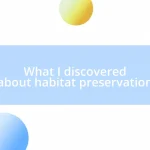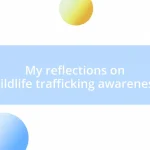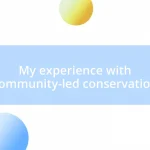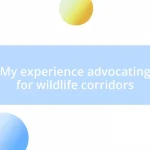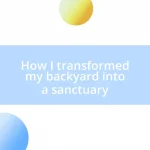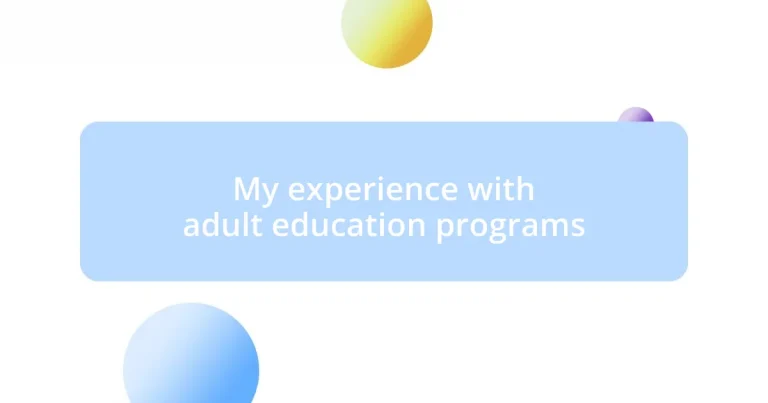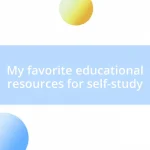Key takeaways:
- Adult education programs foster lifelong learning, accommodating diverse learners such as working professionals, parents, and retirees.
- Reasons for pursuing adult education include career advancement, personal fulfillment, skill enhancement, networking opportunities, and flexibility.
- Participants in adult education often experience personal growth, increased confidence, and a sense of community through shared learning experiences.
- Challenges such as time management, financial constraints, and the fear of returning to school can impact adult learners, but support and camaraderie can help overcome these hurdles.
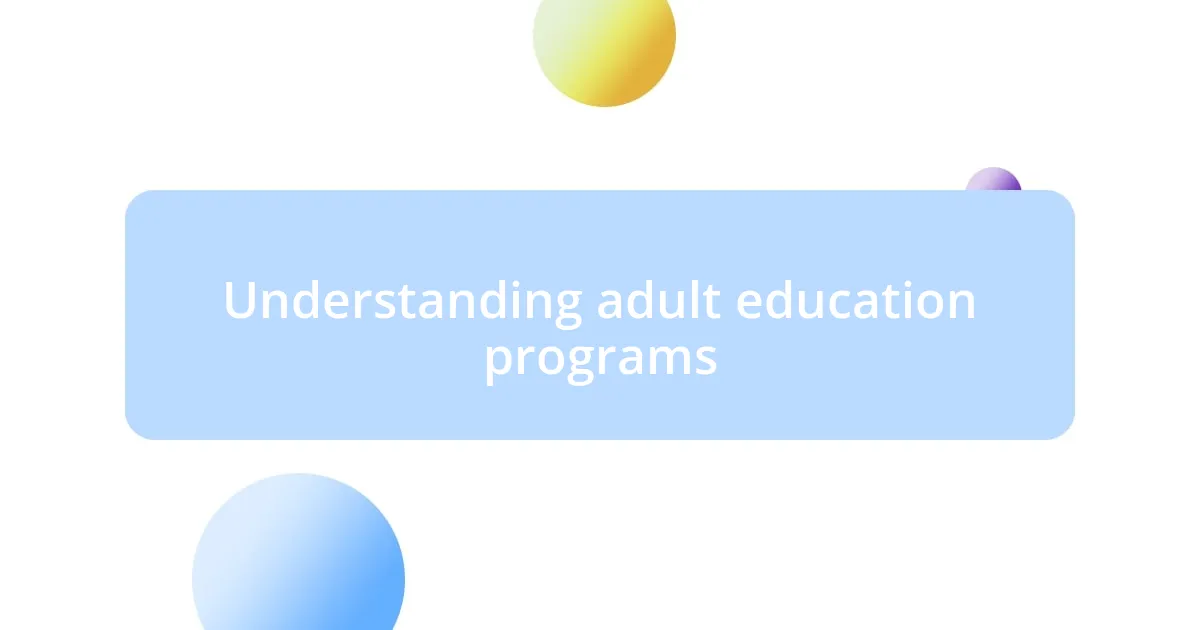
Understanding adult education programs
Adult education programs are designed to support lifelong learning, accommodating those of us who may have missed opportunities earlier in life. I remember walking into my first class feeling overwhelmed, thinking, “Can I really keep up with this?” It’s a common emotion, but that initial fear quickly transformed into excitement as I realized that every participant brought unique perspectives and experiences to the table.
These programs often cater to a diverse array of learners, including working professionals, parents, and retirees. I met a fellow student in my program who was a grandmother seeking to improve her digital skills for better communication with her grandchildren. Her determination inspired me—here was someone embracing education at an older age, proving that learning truly knows no bounds.
Teachers in adult education understand that the motivations and formats for adult learners can be vastly different from traditional students. I appreciated the conversational and collaborative approach they employed. It made learning feel less like a chore and more like a community effort. Isn’t it remarkable to think about how education can adapt to our lives, rather than the other way around?
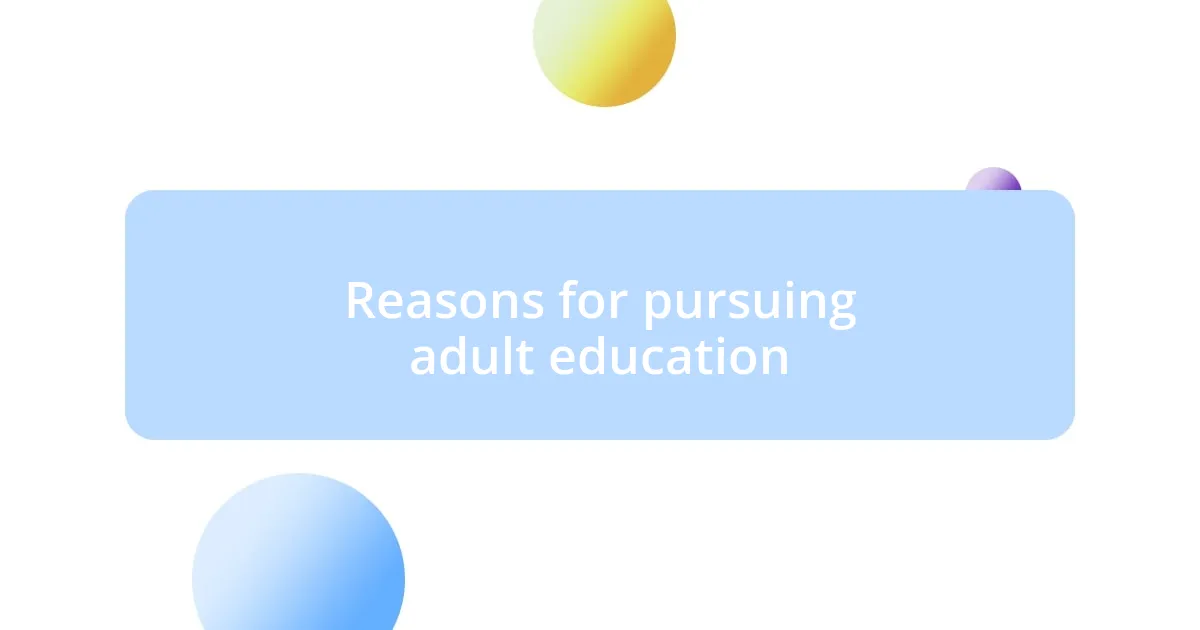
Reasons for pursuing adult education
Adult education opens doors for so many reasons, each rooted in personal ambition and the desire for growth. I was driven by the need to acquire skills for a career change, a sentiment that many share when they step back into the classroom. The experience was more than just learning; it was about rediscovering confidence in my abilities and reigniting a passion for knowledge that I thought had faded.
Here are some key reasons why many of us choose to pursue adult education:
- Career Advancement: Many adults seek new qualifications or skills to improve their job prospects or transition into new fields.
- Personal Fulfillment: For some, the drive to learn comes from a deep-seated desire to achieve something they’ve always wanted, whether it’s painting, coding, or writing.
- Skill Enhancement: Upskilling to keep pace with changing technologies or industry demands is a common motivation. For instance, I took a marketing class that equipped me with digital tools I previously knew nothing about.
- Networking Opportunities: Meeting people from various backgrounds can lead to valuable connections and friendships, enriching the learning experience.
- Flexibility and Convenience: Many adult education programs offer online or evening classes, making it easier to balance learning with work and family responsibilities.
The journey I embarked on wasn’t just about gaining knowledge; it was about embracing challenges and seeing how far I could push myself. Each class I attended felt like a shared adventure, where we all brought our own stories and dreams into the mix. It struck me how united we were in our pursuit of growth, and that camaraderie made every lesson worthwhile.
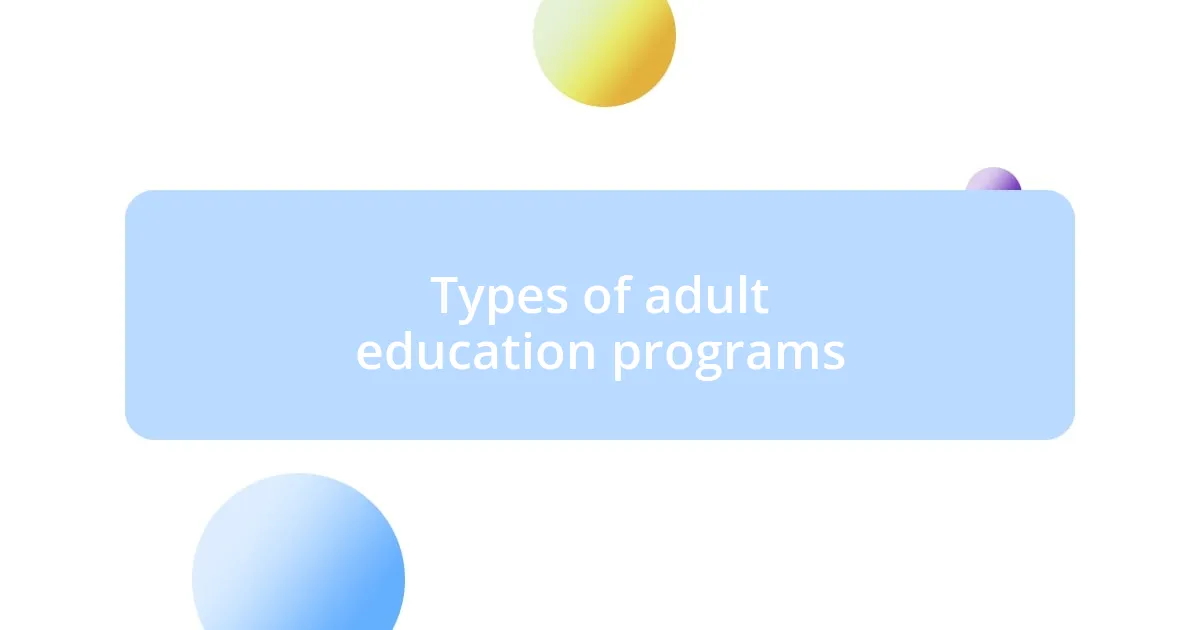
Types of adult education programs
Adult education programs come in several forms, each tailored to meet the diverse needs of learners. For instance, there are formal degree programs designed for those looking to earn college credits or degrees later in life. I recall meeting a fellow student who was pursuing a Master’s degree—he was not just a student; he was a father of three. His motivation resonated with me; he wanted to set an example for his children about the importance of education at any age.
In addition to formal education, there are also non-formal programs like workshops and certification courses. These tend to be shorter in duration and focus on specific skills or areas of interest. I once attended a weekend writing workshop that rejuvenated my creativity. Not only did I learn new techniques, but I also bonded with others who shared my passion for storytelling. The thrill of exchanging ideas with fellow aspiring writers made the experience feel lively and enriching.
Finally, informal educational opportunities shouldn’t be overlooked. These involve self-directed learning through online platforms and community classes, allowing learners to explore subjects at their own pace. The freedom of choosing what and when to learn was liberating for me, especially when I took up painting during a local community class. It wasn’t just about the skills I gained; it was a wonderful outlet for self-expression, and I felt a strong sense of belonging in that creative space.
| Type of Program | Description |
|---|---|
| Formal Education | Structured programs leading to degrees or certifications, often requiring several years of study. |
| Non-Formal Education | Short courses or workshops focusing on specific skills or topics, allowing for flexible learning. |
| Informal Education | Self-directed learning through online resources or community classes, catering to varied interests and paces. |
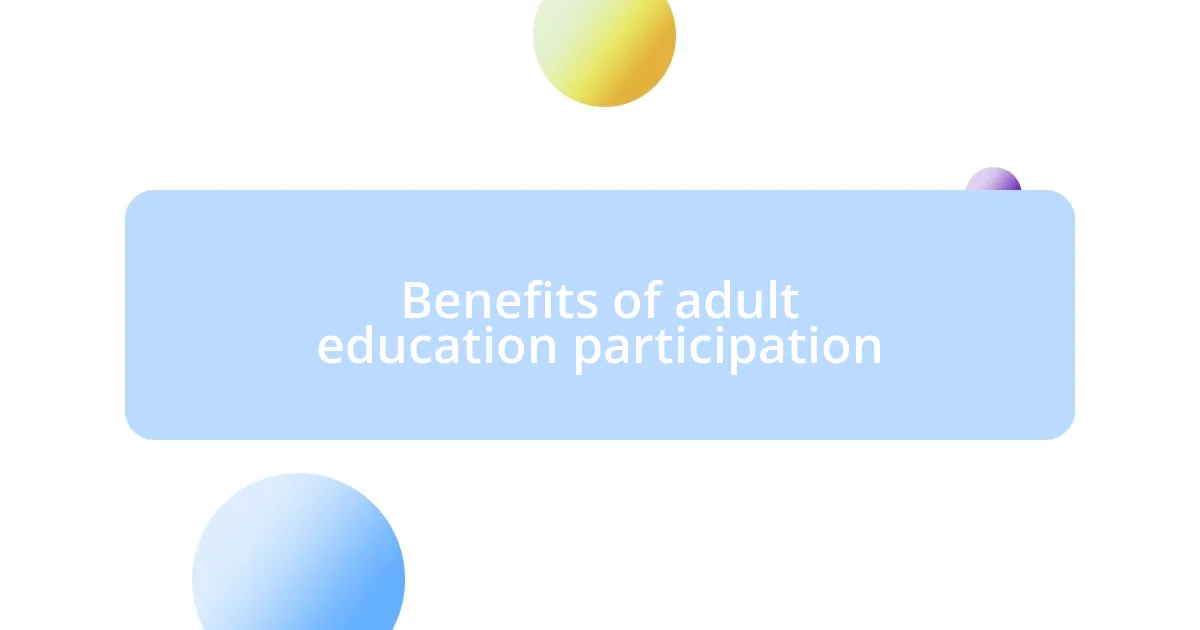
Benefits of adult education participation
Participating in adult education can truly transform one’s life. For me, it opened up avenues I never thought were possible. I still remember the day I returned to school; I felt a mix of excitement and nervousness. That initial belief that learning was solely for the young quickly faded as I realized how much joy it brought me. Have you ever felt that rush of excitement when mastering something new? It’s like rediscovering a part of yourself that had been quietly waiting to emerge.
One of the most significant benefits of adult education is the ability to enhance one’s career. After enrolling in a specialized course, I found myself not just learning but also applying new skills that directly led to a promotion at work. I often wonder; how many opportunities go unnoticed simply due to a lack of updated knowledge? Investing in education can be the key to unlocking those doors, ensuring you stay relevant and competitive in today’s fast-paced job market.
Moreover, adult learning fosters a sense of community and belonging. During my studies, I formed connections with classmates who shared similar struggles and aspirations. It was comforting to know that I wasn’t alone on this journey. Isn’t it incredible how shared experiences can forge friendships? Each discussion, each project, brought us closer together, and by the end of our courses, I had forged bonds that extended beyond the classroom. These relationships became a network of support, motivating us to push our boundaries.
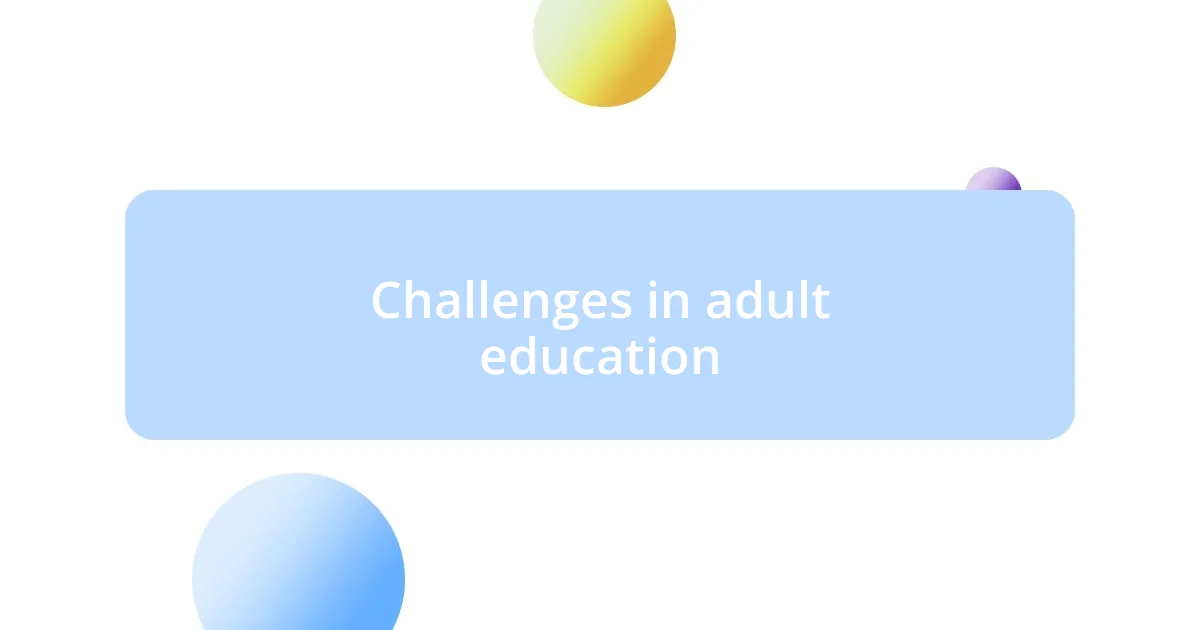
Challenges in adult education
Navigating adult education can be a daunting journey, and one major challenge often lies in balancing time. I found myself juggling work, family, and school commitments, which sometimes felt like a juggling act on a tightrope. Have you ever had that moment when everything seems to demand your attention simultaneously? It can be overwhelming, forcing many to question if they can truly handle it all.
Financial constraints can also pose a significant hurdle in pursuing education. I recall a time when I hesitated to enroll in a valuable certification course simply because I was worried about the costs. It made me think: how does one find a way to invest in themselves amidst other pressing financial obligations? Fortunately, through scholarships and community resources, I realized that support was often closer than I thought.
Moreover, the fear of returning to a learning environment is a challenge few openly discuss. Walking into a classroom full of much younger students felt intimidating at first. I remember the flutter in my stomach as I sat down, wondering if I could keep up. Did you ever feel out of place in a new setting? With time, I learned that my unique life experiences brought invaluable perspectives to the discussions, easing my initial fears and helping me build confidence in my voice.
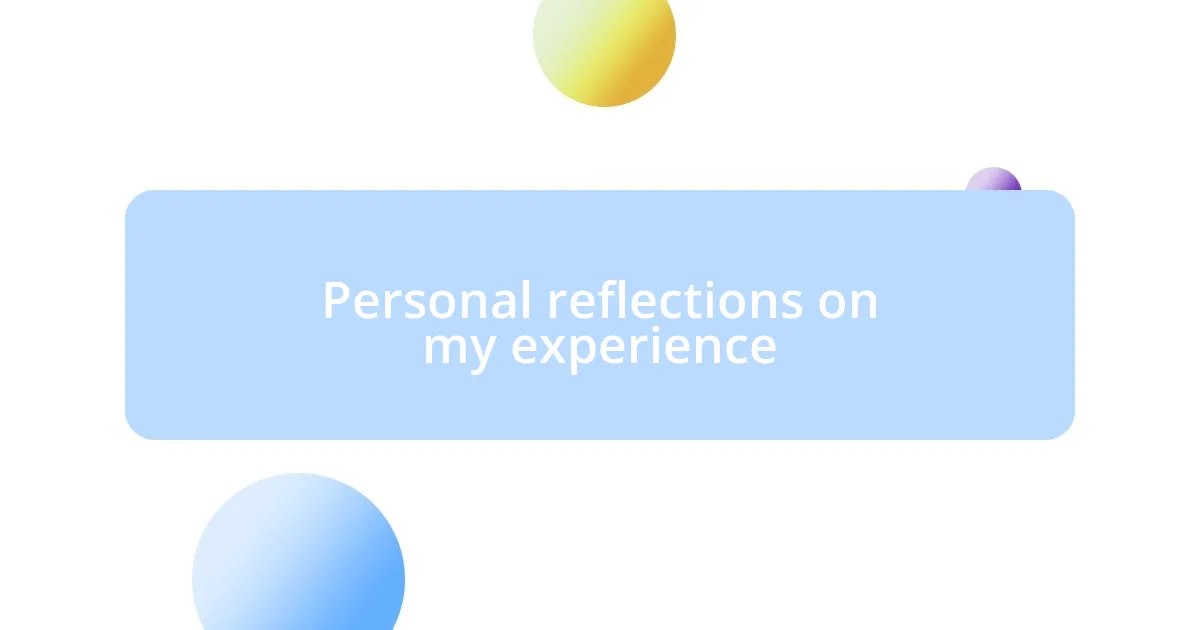
Personal reflections on my experience
Reflecting on my journey through adult education, I can’t help but think about how much I underestimated my own capability to learn. One evening, after a long day at work, I sat in front of my laptop, feeling exhausted yet eager to dive into my coursework. The sense of accomplishment I felt after submitting an assignment was intoxicating. It reminded me of what it was like to feel proud of my efforts, a feeling I thought I had lost long ago.
There were moments when doubt crept in, especially during group projects. I remember one particular instance where my team struggled to agree on ideas, and I found myself hesitating to voice my thoughts. But then I asked myself: “What if my perspective could spark a breakthrough?” That question pushed me to speak up, and it was liberating. I learned that every voice matters, and sometimes, sharing our unique experiences leads to the most innovative solutions.
Looking back, I realize that my adult education experience was as much about personal growth as it was about acquiring knowledge. After several late nights spent studying, I developed a resilience I didn’t know I had. The joy of learning rekindled old passions I had buried under daily responsibilities. Moments like those left me wondering—how many hidden talents and interests are waiting to be unlocked through the power of education?

